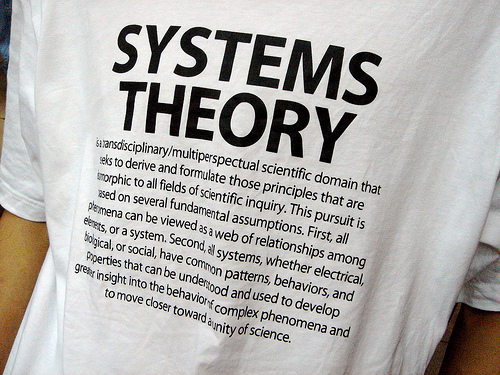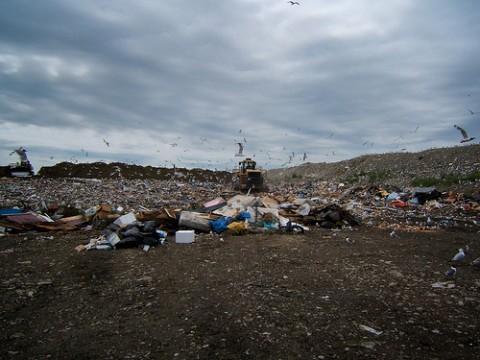November 4, 2010

|Image from Pegasus Communications|http://www.pegasuscom.com/course_preview/gettingstarted/whyiceberg.htm|
Systems thinking is in the air. This past weekend I was delighted to have the opportunity to teach an introductory course on the topic with John McGah of Give Us Your Poor. Together we took 17 graduate students in the UMass-Boston MSPA program through an intensive and interactive look at the world through the systems lens. Even before we got things rolling on Saturday morning, the pre-reading (Donella Meadows’ Thinking in Systems) had provoked two people to say that they were already seeing the world differently (and more clearly). By the end of our 36 hour romp, which included guest presentations by David Peter Stroh and Paul Plotczyk, students were saying that all public sector employees, nay EVERYONE, should be required to take a systems thinking course. All of this enthusiasm comes just a week in advance of Pegasus Communications’ annual systems thinking conference here in Boston, which has a focus on “Fueling New Cycles of Success.” I am very excited to attend, and look forward to building upon the wisdom I’ve gleaned thus far about surfacing and living with systems (human and otherwsie), which includes these gems: Read More
October 27, 2010

|Photo by marcomagrini|http://www.flickr.com/photos/marcomagrini/698692268|
“We don’t talk about what we see,
we see only what we can talk about.”
– Fred Kofman
This week I’ve been rereading Donella Meadows’ Thinking in Systems and really savoring it. Each time I look at it, I pick up something new, not just about systems thinking but about life in general. I’ve been focused primarily on Meadows’ chapter “Living in a World of Systems,” which considers how we can work with complex systems while acknowledging that even when we understand them better, we cannot predict or control them. One of her suggestions is that we learn to pay attention to what is important, not just what is quantifiable. This is not a question of throwing out what we can quantify as being somehow overly reductionist. Rather, it is a matter of not giving up on what we cannot measure and making quantity more important than quality. How important this is for our social change work! Read More
July 1, 2010
For the better part of the last year and a half, my colleagues Ashley Welch and John McGah and I have been moving forward an IA/IISC cross-sectoral practice to bring Interaction methods + to the support of sustainability endeavors. Our early meetings around this budding practice included conversations about how best to frame leadership development for sustainability. We arrived at the graphic above, which combines what we see as the core elements needed for leadership to embrace and enroll others in sustainable pursuits.
With a foundation (watermark, if you will) of content knowledge about what sustainability is, the three elements are as follows:
• Systems Thinking (Seeing) – This is all about helping individual leaders and collective leadership see the whole, to understand that nothing stands in isolation, and that we must have a deeply felt sense of the interconnectedness of phenomena in order to make truly informed decisions. We take both our inspiration and instruction in this realm from the likes of the Sustainability Institute, the Center for Whole Communities, and The Elumenati.
• Self-Awareness (Being) – What we do is informed by who and how we are in the world. Awareness of our own beliefs, mental maps, and inherent tendencies is a powerful lever for making the sustainability shift, for aligning thought behind action. Self-awareness might also be cast as mindfulness, or the ability to be present to what is. Here we build upon our existing work around the inner side of leadership with the contributions of the Pachamama Alliance and John Milton.
• Collaborative Capacity (Doing) – With the whole in mind and awareness of our inner state, leadership will have a greater understanding of the need to work collectively toward more sustainable lifestyles and ways of doing business. Collaborative skill is key, including knowing how to frame sustainability efforts, create the right conditions for innovation, build agreement, structure decision-making, and design life-affirming experiences for diverse stakeholders. This is the heart and soul of the Interaction Method, and it is supplemented by the work of Keith Sawyer, CRED, and the many pioneers of large group methods and network-building.
Another key element and overlay for all of these is leadership’s ability to understand and navigate power dynamics as they play out in systems, in ourselves, and in our chosen methods for working together.
Eager to hear your reactions, tweaks, and additions.
June 14, 2010

|theory.isthereason.com|http://theory.isthereason.com/?p=1764|
One of our consultants just wrote the following e-mail to our team here at IISC. I thought it would be a good idea to put the question out to our readers – any thoughts?
Hello Colleagues,
I am wondering if you might have ideas about two things:
1. How to introduce systems thinking to a group – simply…
2. What questions you might ask when trying to identify leverage points in a planning process?
Context: The group has gathered a lot of anecdotal information, the intention is to gather additional information on best practices and research, however, we are not there yet. So how to begin to identify levers when we don’t have the benefit of having all data?
Thanks for any thoughts you might have on this!
June 14, 2010

|theory.isthereason.com|http://theory.isthereason.com/?p=1764|
One of our consultants just wrote the following e-mail to our team here at IISC. I thought it would be a good idea to put the question out to our readers – any thoughts?
Hello Colleagues,
I am wondering if you might have ideas about two things:
1. How to introduce systems thinking to a group – simply…
2. What questions you might ask when trying to identify leverage points in a planning process?
Context: The group has gathered a lot of anecdotal information, the intention is to gather additional information on best practices and research, however, we are not there yet. So how to begin to identify levers when we don’t have the benefit of having all data?
Thanks for any thoughts you might have on this!
September 18, 2009
A few months ago, while attending the 95th session of the Hampton University Minister’s Conference, I heard my most favorite preacher of all times, the Rev. Dr. Claudette Copeland use a brilliant illustration that got me thinking about systems thinking, networks and collaboration. I will surely integrate this illustration into my consulting and training practice, and recount it herewith for your enjoyment and cogitation: Read More
August 6, 2009

When we throw it away, it doesn’t go away. This is an important lesson of both systems thinking and ecology. Fritjof Capra, physicist and founding director of the Center for Ecoliteracy, writes that we need to relearn the fundamental facts of life, including the fact that matter continually cycles through the web of life and that one person’s (or species’) waste is another’s food. If our awareness and actions shifted in accordance with these facts, how would we live and work differently?
April 21, 2009
I am currently working with a client who is focusing on an issue that illuminates all of our recent blogs about this great moment of transition. They are seeking to influence the international community to make the issue of fragile states, a first order root cause in creating an unjust and disordered world. And, here’s the problem…the U.S is still working out of its cold war script i.e. that “most transnational problems like terrorism or piracy can be linked back to an enemy state with an irredeemable ideology” though most recently there are signs that a new understanding is beginning to emerge. The Obama administration is talking about “smart power” and the need for multilateral action. And, Director of National Intelligence Dennis Blair recently testified to Congress that ‘In recent years, it seems that we’ve had more security problems from states that have been in trouble than we have from strong states that have been an adversary to us in the traditional way” And, hello…we’re making friends with Cuba!
In Donella’s Meadows book, “Thinking in Systems”, she talks about the greatest leverage point, or place to intervene in a system to make change is at the level of paradigm, the mind-set. She describes this as the shared idea in the minds of society, the great big unstated assumptions about how the world works. So, here we are with a front row seat as so many of these great big unstated assumptions are being examined opening the door for real change. Let’s be aware and awake and contribute where we can!




